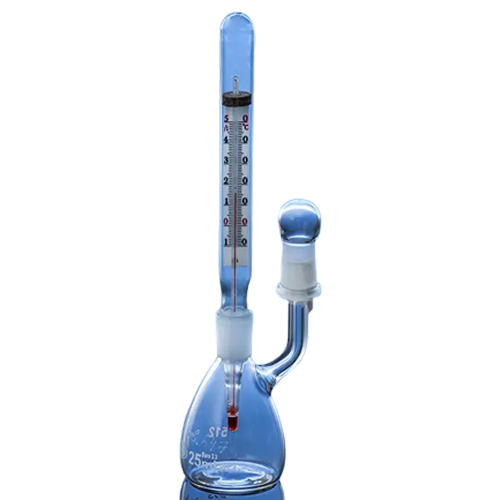A Pycnometer (Calibrated Class A with Thermometer) is a high-precision laboratory instrument used to determine the density or specific gravity of liquids. This type of pycnometer includes an integrated thermometer, enabling precise control and monitoring of the measurement temperature, which is critical because density varies with temperature. It is typically made of borosilicate glass 3.3 for thermal and chemical resistance and conforms to Class A calibration standards, ensuring high volumetric accuracy (±0.01 mL or better). These pycnometers are calibrated at a standard temperature (usually 20°C), and the built-in thermometer is either mercury, spirit-filled, or digital-compatible, depending on the version. This version is commonly used in analytical chemistry, petrochemical, pharmaceutical, and quality control laboratories where temperature-controlled density determination is essential.
Technical Specification of Pycnometer(Calibrated Class A Thermometer)
-
Material:
-
Body: Borosilicate glass 3.3
-
Thermometer: Built-in or removable, usually 0–50°C range
-
-
Volume Range:
-
Commonly: 10 mL, 25 mL, 50 mL, 100 mL
-
Marked with precise calibration line
-
-
Calibration:
-
Class A tolerance (very high accuracy)
-
Calibrated at 20°C (unless specified otherwise)
-
May include serial number and certificate of accuracy
-
-
Thermometer Integration:
-
Inserted into the pycnometer body or sealed within
-
Scale typically in 0.1°C or 0.2°C increments
-
May be spirit-filled, mercury (rare today), or digital-probe compatible
-
-
Closure:
-
Ground glass stopper with capillary bore for precise liquid overflow
-



There are no reviews yet.